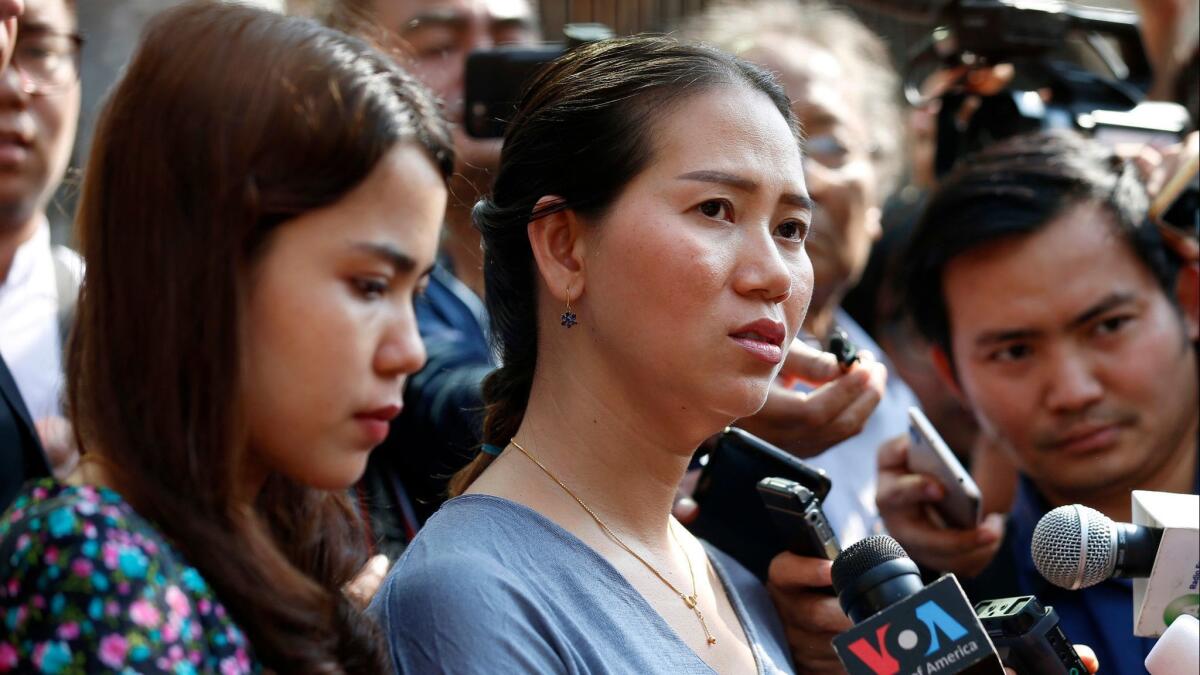Myanmar judge rejects the appeal of two jailed Reuters reporters

Reporting from Singapore — A Myanmar court on Friday rejected the appeals of two jailed Reuters reporters facing seven-year prison terms for violating a state-secrets law in a decision that cast doubt on the country’s commitment to democracy and the rule of law.
A judge ruled that reporters Wa Lone, 32, and Kyaw Soe Oo, 28, failed to provide enough evidence to overturn a lower court’s decision in September convicting the journalists in connection with their investigation into attacks on Rohingya Muslims.
“The judgment is very disappointing,” Than Zaw Aung, a lawyer representing the reporters said outside the courthouse. “It highlights the situation of press freedom … in Myanmar.”
He said he would talk to the journalists and their families to determine what steps to take next. The case could potentially go to Myanmar’s supreme court.
The decision drew a rebuke from the U.S. Embassy in Yangon, the capital of Myanmar.
“We are deeply disappointed that the Yangon High Court upheld the convictions of journalists Wa Lone and Kyaw Soe Oo today,” said Aryani Manring, a spokesperson for the embassy. “A free and independent press should be protected in any democracy.”
The embassy has been monitoring the case since 2017 and had staff present at court proceedings Friday.
Reporting is not a crime
— Stephen J. Adler, Reuters’ editor in chief
Stephen J. Adler, Reuters’ editor in chief, said the rejection of the journalists’ appeal represented a dramatic setback for the country formerly known as Burma, which only recently emerged from decades of military control.
“Today’s ruling is yet another injustice among many inflicted upon Wa Lone and Kyaw Soe Oo,” Adler said in a statement. “They remain behind bars for one reason: those in power sought to silence the truth. Reporting is not a crime, and until Myanmar rights this terrible wrong, the press in Myanmar is not free, and Myanmar’s commitment to rule of law and democracy remains in doubt.”
The convictions in September drew international condemnation for silencing independent reporting on the terror inflicted on Rohingya Muslims by government forces and Buddhist civilians. That violence has resulted in 700,000 members of the ethnic group fleeing for neighboring Bangladesh since August 2017.
The reporters, who are both Myanmar nationals, were arrested in December 2017 as they were investigating the massacre of Rohingya villagers in Inn Din, a hamlet in Rakhine state.
Their defense attorneys say they were detained after police entrapped the reporters by meeting them at a restaurant and offering them documents claiming to show details about the army campaign in Rakhine.
Taking such papers would violate the country’s 1923 Official Secrets Act, which imposes harsh punishment for obtaining government documents that could be deemed “useful to an enemy.”
The two journalists have pleaded not guilty to the charges.
Last February, Reuters published their reporting, which detailed the execution of 10 Rohingya villagers who were bound and either shot or hacked to death before being buried in shallow graves.
The reporting provided a chilling and intimate snapshot of the wider government-led campaign to eradicate the Rohingya, using a combination of murder, arson and rape.
The actions have reversed the view abroad of Aung San Suu Kyi, the Nobel Peace Prize laureate and leader of the National League for Democracy, which spearheaded Myanmar’s political reforms. Suu Kyi has been criticized for not speaking out against the military’s campaign against the Rohingya or the jailing of the Reuters journalists under the colonial-era law.
The arbitrary nature of the state-secrets law has been chided by diplomats and human rights groups. Activists say the decision Friday will only reinforce the belief the case against the journalists was a sham.
“The case against these two journalists should never have proceeded much less resulted in a conviction,” said Phil Robertson, deputy director of Human Rights Watch’s Asia division. “The appeals court process looks like it was just a rerun of the previous injustice done to these two reporters who dared investigate what the military wanted to keep hidden.”
Twitter: @dhpierson
More to Read
Sign up for Essential California
The most important California stories and recommendations in your inbox every morning.
You may occasionally receive promotional content from the Los Angeles Times.











